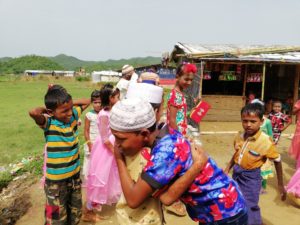UN, Bangladesh Launch Joint Effort to Verify Rohingya Refugee Identities
By Jesmin Papri and Abdur Rahman on Jun 27, 2018 04:20 pm
The United Nations refugee agency is working with Bangladesh’s government to verify the identities of Rohingya refugees who fled from Myanmar’s Rakhine state and issue ID cards, officials said Wednesday.
The verification process is expected to last half a year and use biometric data, including iris scans and fingerprints, to confirm people’s identities, according to the U.N.’s refugee agency, UNHCR.
“This exercise is a major step forward to establish the legal identity of Rohingya refugees from Myanmar,” said Kevin J. Allen, head of operations for UNHCR in Cox’s Bazar, a district in southeastern Bangladesh that has borne the brunt of an unprecedented influx of Rohingya refugees from Rakhine since August 2017.
The process will help consolidate a unified database for the purpose of managing and documenting refugees’ identities, maintaining population statistics, as well as protecting and assisting the refugees, the agency said in a statement Tuesday. All refugees older than 12 years will get ID cards after their identities are verified.
“It makes clear that the Rohingya exist, that their rights must be respected and that we are committed to laying the foundations for solutions,” Allen said.
Caroline Gluck, a UNHCR public officer in the district, told BenarNews on Wednesday that more than 300 field workers were involved in the project.
A senior Bangladeshi government official confirmed that the project was under way.
“The verification exercise started four days ago. It will take at least six months to finish,” Mohammad Abul Kalam, Bangladesh’s commissioner for refugee relief and repatriation, told BenarNews on Wednesday.
More than 900,000 Rohingya refugees are sheltering in southeastern Bangladesh, according to the latest estimates from U.N. and humanitarian relief agencies. These include 706,000 refugees who fled from Rakhine after Myanmar security forces launched a brutal crackdown in retaliation for attacks on an army and police outposts by Arakan Rohingya Salvation Army insurgents on Aug. 25, 2017.
Last November, the Bangladesh and Myanmar governments signed an agreement calling for the voluntary repatriation of hundreds of thousands of Rohingya to begin by Jan. 22. A precondition of the agreement was verification of refugees’ identities by Myanmar officials.
In February, Bangladesh presented a list of 8,032 Rohingya for verification by Myanmar. Since then, no refugee has been repatriated.
At the time of the agreement, United Nations Secretary General Antonio Guterres expressed concern that the agreement did not have a role in repatriation for UNHCR or any other U.N. agency. Since then, both Bangladesh and Myanmar have signed separate memoranda of understanding with UNHCR to facilitate the process.
Database
In an effort to identify the refugees properly, the Bangladesh home ministry set up biometric registration camps in Ukhia and Teknaf – two sub-districts of Cox’s Bazar – to create a database of Rohingya entering Bangladesh. UNHCR is assisting in managing the database.
“The verification is an important milestone in contributing to securing the identity of persons who have fled from Myanmar and are now being generously hosted in Bangladesh,” UNHCR said.
Kalam told BenarNews that the verification process would not affect the ongoing repatriation deal with Myanmar, and said they would proceed in a parallel manner. He could not predict when repatriation, already more than five months past the target date, would begin.
“The repatriation process will continue as agreed. Joint verification will go on. The UNHCR will manage the database and correct the mistakes, if any,” Kalam said.
In addition to managing the database, UNHCR will issue plastic identity cards to refugees.
The cards will bear logos of UNHCR and the Bangladesh government and will state: “This person should be protected from forcible return to a country where he/she would face threats to his/her life or freedom,” Reuters news service reported. The cards will list the refugees’ country of origin as Myanmar.
“The cardholders will enjoy all facilities as refugees. Besides, the card will play an important role for repatriation,” Kalam said.
Myanmar does not recognize Rohingya as citizens and has not issued identity cards to many of them, slowing the verification process necessary for repatriation.
“The verification will also play a key role in verifying the identity of refugees, establishing that they have been displaced from Myanmar, and enabling them to exercise their right to voluntary return to their country when it is safe for them to do so,” UNHCR said.










